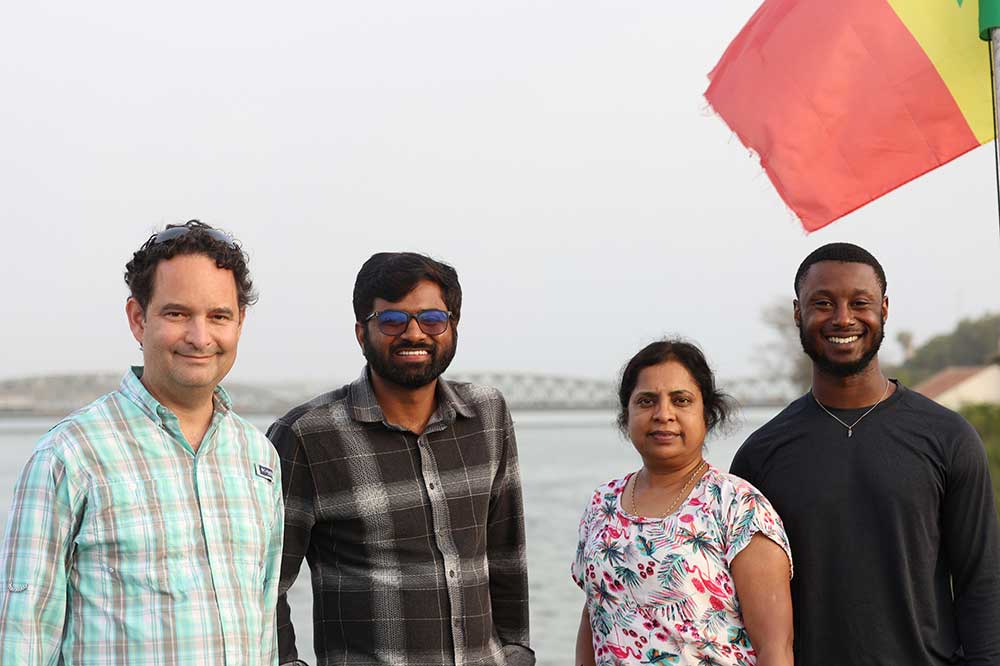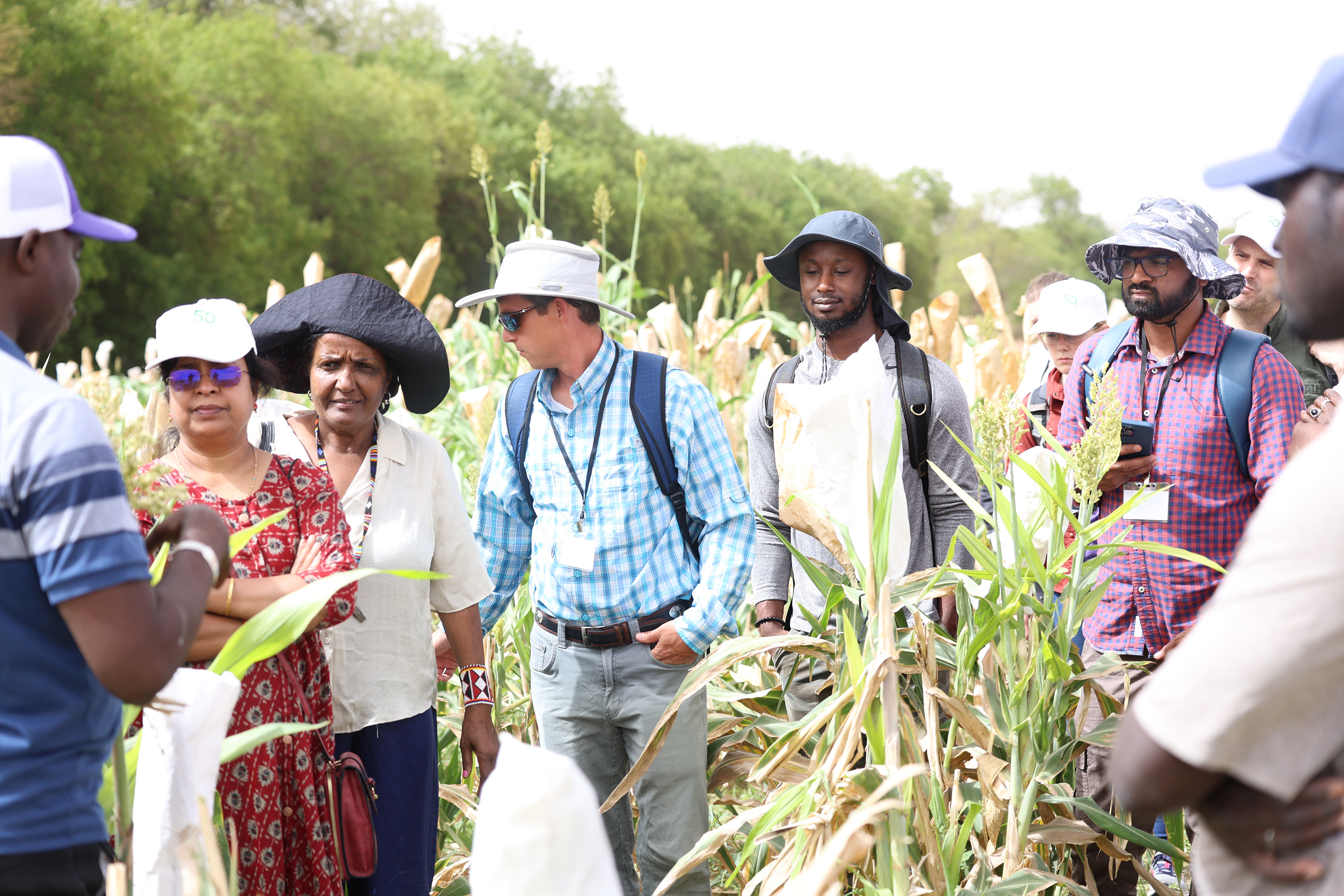
DSU researchers travel to Senegal to meet with West African partners
A climate change-related project to increase the resiliency of four major cereal crops recently propelled a team of Delaware State University researchers to the West African country of Senegal.
The DSU Team – Dr. Kalpalatha Melmaiee, Post Doctoral fellow Dr. Amar Vennapusa, and Research Technician Mr. Mekhai Abrams (who will be a DSU Ph.D. student in the fall of 2024) – made the trip as part of a multi-university effort to establish a Feed the Future Climate Resilient Cereals Innovational Lab (CRCIL).
Kansas State University is the lead U.S. higher education research entity. DSU is a core program partner, along with Clemson University, Cornell University, Louisiana State University, and the University of Florida, as well as international partners in South Asia, Eastern and Western Africa, and Latin America.
The research initiative aims to advance the breeding for four major world crops – sorghum, millet, wheat and rice – and thereby make such cereal crops more readily available to people in countries who are most at risk for hunger and malnutrition. Breeding cereal crops that are resistant to both heat and drought may also increase resilience.
In this initiative, DSU joins Kansas State University – the lead university – along with Clemson University, Cornell University, Louisiana State University, University of Florida, and international partners in South Asia, Eastern and Western Africa and Latin America.
Dr. Melmaiee, Associate Professor of Agriculture/Natural Resources and the Principal Investigator in the DSU portion of the initiative, and her team met with partner scientists and farmers at Senegalese research facilities in Dakar and the surrounding areas of Thies, Bambey, and Saint-Louis. Senegalese research leaders presented Senegal’s climate-resilient trait priorities for CRCIL’s four key crops, and the DSU team received training on CRCIL’s Monitoring, Learning, and Evaluation (MEL) strategy.
The presentations provided insight into the goals and capacities for research of each crop and aimed to develop a MEL strategy that is most relevant to projects in Senegal. An additional meeting included officials of the West and Central African Council for Agricultural Research and Development (CORAF) in Dakar. Established in 1987, the organization includes the national agricultural research systems of 23 countries in West and Central Africa. The overall goal of CORAF is to enhance the research innovation capabilities of West Africa, as well as increase regional capacity and impact.
Dr. Vennapusa said that it was an enlightening experience in which he learned about the impact of climate change on the local community. “Meeting with farmers and scientists and visiting research stations made me realize the urgent need for research to enhance crop resilience in a changing climate,” he said. “Being part of a group addressing global food security is a proud moment.”
Mr. Mekhai also said it was an “eye-opening experience” for him. “I got the chance to meet scientists and witness first-hand the research being done to combat the changing climate,” he said. “It was an honor to have the opportunity to be a part of a diverse group of people who all share the common goal of making a difference.”
Dr. Melmaiee said, “Young scientists’ involvement in global research planning and discussions is very important to future food production. For that reason, Mr. Abrams and Dr. Vennapusa were included on the trip to Senegal so that they could meet collaborating scientists, observe conditions first-hand, and be involved in project planning.”
Moving forward, each institution will collaborate with partner scientists to research one or more climate resilience priorities in Millet, Rice, Sorghum, and Wheat. DSU will work with Senegal researchers Dr. Jacques Faye and Dr. Cyril Diata to develop drought-resistant Sorghum lines. Sorghum currently faces sensitivity to abiotic stresses such as drought, high-temperature stress, and low grain yield. “Stay-green” will be the target trait for achieving Sorghum lines in this project.
“Stay-green” refers to a plant’s ability to maintain its photosynthetic capabilities and sustain chlorophyll levels during exposure to stress. Breeding Sorghum with the Stay-green trait demonstrates tolerance to abiotic stresses and contributes to higher crop yields. Dr. Melmaiee said, “This trip provided our team with the opportunity to interact with collaborators personally and brainstorm ideas with them for future research and capacity building.”
CRCIL Director Jagger Harvey said that “the participation of Dr. Melmaiee’s research group, as key contributors to the CRCIL program, enriched the planning discussions and will help ensure our efforts are aligned with end-user needs for inclusive and sustainable impact. We are grateful for the partnership of Delaware State University.”
Overall, the visit to Senegal provided the opportunity to observe the day-to-day operations of international collaborators’ research facilities to determine the capacity of future projects. International collaborators created a space to hear the needs and concerns of local farmers who face difficulties due to climate change. It is inspiring to be a part of an initiative that aims to make a difference in the world.
The multi-university initiative announced in November 2023 is part of the U.S. Agency for International Development’s $22M grant to establish the CRCIL Program. Of that federal funding, $600,000 is earmarked to DSU for its research role in the project.

